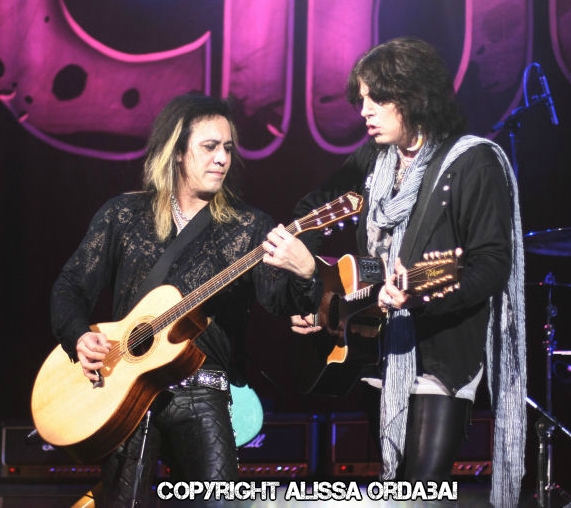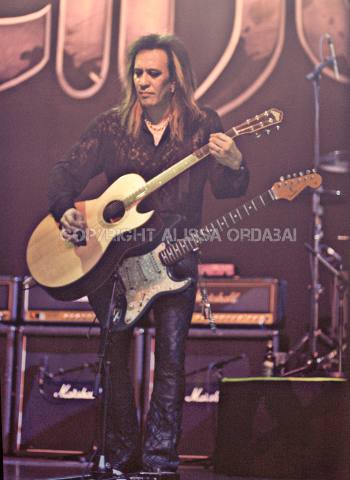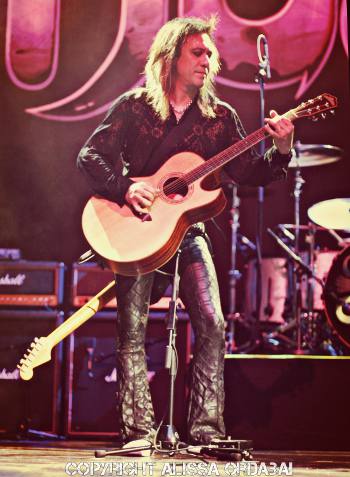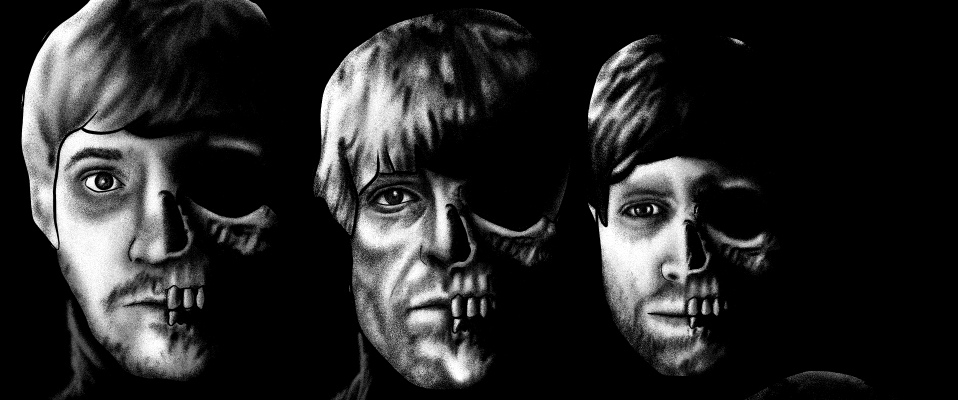
by Alissa Ordabai
– Senior Columnist —
The last time Hardrock Haven interviewed Jeff LaBar, he had no plans of a solo album. Now three years have flashed by and what do you know – LaBar’s first ever solo release titled One For The Road is about to hit the stores. In our previously unpublished 2011 London interview the guitarist talks about his approach to musicianship, his view on changing rock music trends, and the creative dynamics within Cinderella — the band that made him famous. Talking to him you suddenly remember that you don’t have to be a shredder to be a great player, and that simplicity and sincerity can carry a musician beyond changing fads and fashions. As LaBar says during our chat, “Do it because you want to do it, not because you are trying to be somebody else or to be a rock star.”
 Alissa Ordabai: Jeff, welcome to London!
Alissa Ordabai: Jeff, welcome to London!
Jeff LaBar: Thank you!
AO: How are you finding England this time around?
JL: With a map! (Laughs).
AO: Right! When was the last time you played in London?
JL: I didn’t know it was going to be a test! 89? 91? A long time ago!
AO: Isn’t it weird how a whole generation of new fans has grown up without ever seeing you live?
JL: Yes, one day I was making my first record, and the next day is today.
AO: How much improvisation goes into Cinderella live shows these days? Do you improvise your solos live?
JL: No. We play the songs right. (Laughs). We play the songs the way that we write. We improvise at practice. At rehearsals we’d improvise transitions from one song to another, or a false start, or an intro into the song. Sometimes we’d make up an intro. And there are places in the set where it’s just free-for-all. There is a place in our show this year where me and Tom just trade back riffs. And usually we put something like that in a show. It’s in a different show this year, but that’s all improvised. And there is some improvisation in “Long Cold Winter”.
AO: How did it work in the studio back in the old days? Would you and Tom work out the solos in advance? Or, actually, are there any Cinderella songs recorded in the studio that is pure improvisation – you go in and do a pure impro?
JL: No. No, I don’t think any of them is pure improvisation. Some of them are worked out, and some of them are worked out in a studio. Tom wrote almost all the songs, so sometimes he would come in with a solo already written, and sometimes we would make them up then. But usually when he didn’t have a solo already written for the song, that meant I had to come up with a solo. And I did it either in the studio, or I did it at home at night, and come in the next day.
AO: Tom being the main songwriter, did he ever write any solos for you?
JL: No. Actually, he helped. He helped to come up with some parts. If I was having trouble with a part, he would say (imitates Keifer’s deep voice): “Try this,” and I’ve done the same things for him. We work together well, and over the years it’s gotten better and better.
AO: Have you learned things from each other?
JL: Oh, yeah! I’ve learnt a lot from him.
AO: Give us a few examples – what have you learned from him, and what has he learned from you?
JL: I don’t know if he’d learned anything from me. (Laughs). But know what I’ve learned from him: guitar appreciation, starting playing older guitars, I’ve learned feel, I’ve learned to slow down.
AO: The control of dynamics?
JL: Yes, dynamics and the flow of the solo. There are habits that I used to have that he helped me break.
AO: For example?
JL: For example, writing a solo. Sometimes I would take a solo 4 bars at a time. I’d do this for 4 bars, and then I’d do this for 4 bars, and then I’d do this for 4 bars. He got me to connect the dots. He got me to make the solos flow more over the next one. He got me to slow down a little, vibrato, he helped me even without trying, just by example. I was like, “Yeah, I like how he does that.” I’ve learned from him.

AO: One thing about Cinderella is that your heyday was the era of shred. Everybody was crazy about those impossible chops, and shred was all the rage. What kept you focused on melodic stuff? On being tuneful, on not overplaying, on connecting with your listener as opposed to standing there trying to impress people with your technique?
JL: When I got into Cinderella, I was a little bit like that. I played in another band and was a little more shred. But I was never that good, never that fast. I wasn’t George Lynch or Warren DeMartini. I was always in between. I was always in between George Lynch and Tom Keifer. I was always a little fast, and a little bluesy, and I was always in between there, and then when I got into Cinderella, that was what I was saying about Tom – he got me to settle down. We pulled out a song from the record which we haven’t played in a long time – “Once Around the Ride.” And I had to re-learn the solo: “Oh, I can’t play like that anymore!”. It’s still fast, and I haven’t played like that in so long. (Laughs).
AO: One thing about Tom is that he’s always been influenced by the ’70s guitar heroes – people like Jimmy Page.
JL: Yeah, me too.
AHO: How did you manage to on the one hand respect the tradition, and at the same time to say something new which was valid for your own generation?
JL: It’s just a matter of taste. In terms of keeping the tradition, we both grew up on the same bands. Both of us were big Alice Cooper fans, Zeppelin, Aerosmith, AC/DC.
AO: Black Sabbath in your case.
JL: Black Sabbath, absolutely. Deep Purple. He went towards Kiss, I went towards Yes. I was listening to a lot of Yes, Genesis, Pink Floyd.
AO: British prog.
JL: Yeah, all British rock. And he was a little big more American rock, but he has always been influenced by second generation blues, which is Zeppelin and Black Sabbath. So we have that in common.
AO: But that’s fine being influenced, but how did you manage to bring out the essence of your generation, of your time? This sparkling vibe of Cinderella – it was all about the 80s –the imagery, the songs. It wasn’t just blues – rehashed and repackaged. It was different, it was unique. How did you manage that?
JL: It just came natural.
AO: From walking down the street, watching TV, hanging with friends, absorbing the vibe?
JL: We just did what we wanted to do. It might have been a little sign of the time. I don’t think we went out to copy anybody. If there was anybody we’d want to copy, it would have been the bands of the 70s.
AO: Which you did to an extent.
JL: But we didn’t want to be any “sign of the time” band.
AO: But you were.
JL: We were trying to be not like anybody else. By the second record we stopped wearing make-up. Nobody remembers that, but the second record we stopped teasing our hear and wearing make-up, and by the third record half of the album was acoustic, with strings and stuff, and we had background singers, and horn sections, and after we did that, a few more records came out like that. We tried to be different after that. (Laughs).
AO: Do you think being a rock guitarist as a profession has changed in any fundamental way since the time when you were starting out?
JL: Oh my god, yeah!
AO: Not in terms of technology, not in terms of distribution, but in terms of pure craft? Do you think there are more expectations of guitar players these days?
JL: No, less!
AO: Less?
JL: Guitar players in new bands – can you name a guitar player?
AO: I’m thinking John 5.
JL: But John 5 is not that new! (Laughs). He’s not exactly new, he’s been around for a long time in several different bands. But what I’m saying is when you see new popular bands, it’s not like the guitar player is popular like name recognition.
AO: Like a guitar hero?
JL: Yeah, if you think about the 80s …
AO: You get your Vai, Gilbert, DeMartini.
 JL: Yeah, that’s what I’m saying. You know the guitar player’s name because he’s got a life of his own. But even newer bands that I like … For example, Nickelback is not new, but say a new-style band, more of this decade anyway, and I really like Nickelback, but I have no idea who the guitar player is.
JL: Yeah, that’s what I’m saying. You know the guitar player’s name because he’s got a life of his own. But even newer bands that I like … For example, Nickelback is not new, but say a new-style band, more of this decade anyway, and I really like Nickelback, but I have no idea who the guitar player is.
AO: Neither do I. And I work for a guitar mag.
JL: Yeah, see? That’s what I mean – it’s not the same name recognition anymore. So that’s the biggest difference.
AO: So you reckon it’s easier now to be a guitar player?
JL: From the music videos that I see – it’s a lot easier. (Laughs). Most songs don’t have the guitar solos anymore. So I’d say it’s easier. (Laughs).
AO: Let’s talk guitar.
JL: OK.
AO: How many guitars do you have on the road with you on this tour?
JL: Well, here these are fly-dates. But in the United States I carry two Les Pauls, a Strat, a Tele, my Gibson double-neck, one Kramer from the 80s and a Washburn acoustic, so I’m carrying seven.
AO: What’s your main guitar for playing live?
JL: My white Les Paul. I have my white 80s Les Paul which is yellow – the old paint has turned yellow, and my double-neck is also yellowed.
AO: From which year?
JL: My Les Paul is from 1980, and my double-neck is from 1988.
AO: You and Tom have both stayed pretty loyal to your Les Pauls. Is there a reason behind that?
JL: I’ve actually started later. He’s started with a Les Paul. I started with Kramer on the first record, and on the first tour I started getting into Les Pauls, and I’ve bought quite a few. Like I said, it was Tom who got me into vintage guitars.
AO: He used to have huge collection back in the 80s.
JL: We both did.
AO: Are you a collector too?
JL: I used to be. Not so much anymore.
AO: Have you kept some of your collection?
JL: Some of them.
AO: Have there been any recent additions to it?
JL: No. When you get older, there are other things in life you want to spend money on. (Laughs). I have all the gear that I want. Or that I need. Gear-wise I’d just spend money on another pedal or something that I need on the road. But I’m not much of a collector anymore. I’m a married man who sits at home with his wife and spends money on furniture. (Laughs).
AO: And you have a son, of course.
JL: Yes, I have a son.
AO: Is he interested in music?
JL: Yes, he plays for School of Rock. It’s the School of Rock All-Star, he’s on tour this summer too with a School of Rock. He’s 18. He plays guitar, and he plays drums. He also plays bass and he sings for School of Rock, and they are doing festivals in the States right now. We might do a show together in February.
AO: What would your advice be to anyone who is just starting out on the guitar?
JL: Same as to my son. The blanket general advice is practice and do it because you want to do it, not because you are trying to be somebody else or to be a rock star. You have to enjoy it, because if you are not enjoying it, you are not going to practice. And if you don’t practice, you are not going to get any good. So first thing you do is learn one song, and that makes you enjoy it. My song took lessons for like a year, and he never practiced. He never practiced his lesson. I’d take him back to lessons every week: “You didn’t learn what they taught you last week, you didn’t practice!”. And he’s say, “Dad, it’s boring.” Because they were teaching him music theory. So I taught him how to play a song. Or actually I taught my nephew how to play a song, and my son got jealous. He said, “Teach me how to play that song!” Once he learnt one song, then it was on. It hooked him, it became fun to him. But it wasn’t fun until he learnt that first song.
AO: Which leads me to my next question. Do you ever play for yourself? Not for practice, not for anybody else, just for your own pure enjoyment?
JL: Not much. Not much anymore. No … I should. You know, I’m busy living life. I’m busy doing other things. Not as much as I’d like to, put it that way.
AO: Did you have a clear musical ambition when you were growing up? Did you want to be a rock star?
JL: No. No. But in high school other people told me, “You are going to be a rock star,” and I was like, “Right!” I didn’t believe that. I played because I enjoyed playing. I had a day job and a night job, and I played in clubs on the weekends. I kept moving forward, but I never expected to do it for a living. (Laughs). I still feel lucky that I’ve made it.
AO: I have one last question. And it’s a bit goofy, but I hope you don’t mind.
JL: Ha-ha!
AO: If you were given an answer to any question in the universe, what would you ask?
JL: Ha-ha! What is my wife really thinking?
AO: Ha-ha! Excellent! Thank you very much for your time.
JL: You are welcome.


